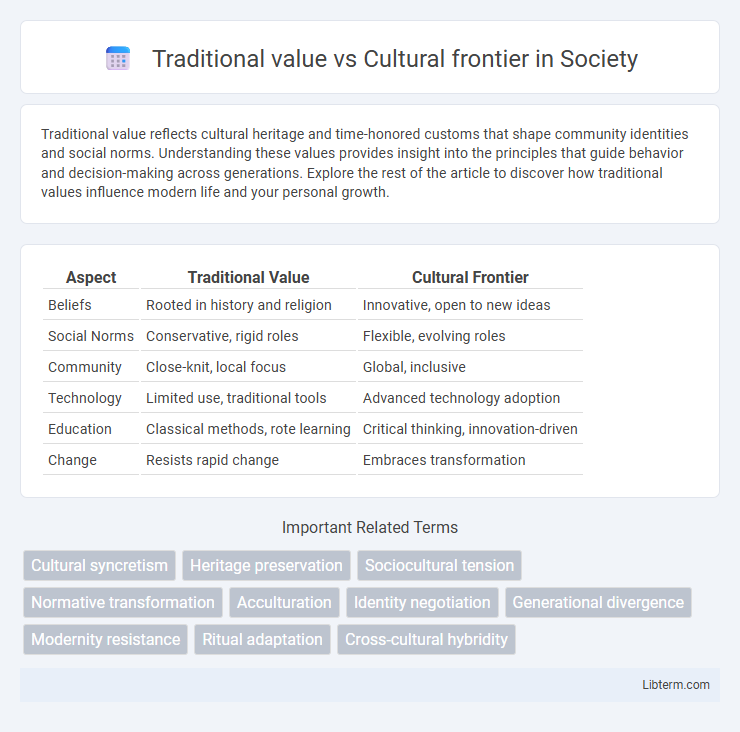Traditional value reflects cultural heritage and time-honored customs that shape community identities and social norms. Understanding these values provides insight into the principles that guide behavior and decision-making across generations. Explore the rest of the article to discover how traditional values influence modern life and your personal growth.
Table of Comparison
| Aspect | Traditional Value | Cultural Frontier |
|---|---|---|
| Beliefs | Rooted in history and religion | Innovative, open to new ideas |
| Social Norms | Conservative, rigid roles | Flexible, evolving roles |
| Community | Close-knit, local focus | Global, inclusive |
| Technology | Limited use, traditional tools | Advanced technology adoption |
| Education | Classical methods, rote learning | Critical thinking, innovation-driven |
| Change | Resists rapid change | Embraces transformation |
Understanding Traditional Values in Modern Societies
Traditional values form the foundational beliefs and practices passed down through generations, shaping identity and social cohesion within modern societies. These enduring norms often intersect with the cultural frontier, where emerging ideals and innovations challenge or redefine established conventions. Understanding this dynamic helps contextualize how communities balance preservation of heritage with adaptation to contemporary global influences.
The Emergence of the Cultural Frontier
The emergence of the cultural frontier marks a shift from traditional values rooted in long-established customs to dynamic cultural expressions shaped by globalization and technological innovation. This transition highlights the growing influence of hybrid identities and cross-cultural interactions that challenge conventional norms. Embracing the cultural frontier fosters creative adaptability and drives societal transformation beyond static traditional value systems.
Roots of Traditional Beliefs and Practices
Traditional beliefs and practices are deeply rooted in ancestral knowledge, often passed down through oral traditions, rituals, and community customs that reinforce identity and continuity. These values emphasize stability, collective memory, and respect for established norms, shaping social structures and daily behaviors. In contrast, cultural frontiers emerge as dynamic spaces where innovation interacts with tradition, challenging long-held beliefs and fostering adaptation to changing environments.
Forces Driving Cultural Evolution
Traditional values anchor societies in long-established beliefs and practices, providing stability and continuity through generations. Cultural frontiers emerge as new ideas, technologies, and global interactions challenge these conventions, driving adaptation and transformation in social norms. Forces such as globalization, technological innovation, and shifting demographics accelerate this cultural evolution, reshaping identities and behaviors in dynamic ways.
Intersections: Where Tradition Meets Innovation
Traditional values often provide a foundational framework that shapes cultural identity, while cultural frontiers push the boundaries by integrating innovation and contemporary perspectives. The intersection of tradition and innovation creates dynamic spaces where heritage is preserved yet reimagined, fostering cultural evolution without losing historical roots. This blend drives societal progress by respecting established customs while embracing technological advancements and new ideas.
Generational Perspectives on Change
Traditional values often emphasize preserving heritage, social norms, and long-standing customs, fostering stability across generations. Cultural frontiers challenge these norms by introducing innovative ideas, diversity, and evolving social practices that resonate more with younger generations. Generational perspectives on change reveal a dynamic tension where older cohorts value continuity, while younger groups advocate for transformation and cultural adaptation.
Challenges to Preserving Heritage
Traditional values often clash with the evolving norms of cultural frontiers, creating significant challenges to preserving heritage. Rapid globalization and technological advances accelerate cultural changes that threaten to erode long-standing customs and traditional practices. Efforts to maintain heritage must balance modernization pressures with the need to protect indigenous languages, rituals, and historic sites.
Navigating Identity Amid Cultural Shifts
Navigating identity amid cultural shifts involves balancing traditional values rooted in historical customs with the dynamic ideas emerging at the cultural frontier. Individuals and communities often experience tension between preserving established norms and embracing innovation that reflects contemporary societal changes. This interplay shapes evolving identities as people reconcile heritage with modern influences.
The Role of Technology in Shaping the Frontier
Technology acts as a catalyst in transforming cultural frontiers by redefining traditional values through digital communication, innovation, and access to global information. It enables communities to preserve heritage while simultaneously adapting to modern societal needs, creating a dynamic interplay between maintaining cultural identity and embracing change. Advances in artificial intelligence, social media platforms, and mobile technology exemplify how technology shapes cultural expression and challenges conventional norms.
Building Bridges: Harmonizing Old and New
Traditional values anchor communities in time-honored beliefs, preserving identity and continuity, while cultural frontiers push boundaries by embracing innovation and diverse perspectives. Building bridges between these paradigms fosters mutual understanding, enabling societies to honor heritage while adapting to modern challenges. Harmonizing old and new cultivates resilient cultures that thrive through balance and inclusive growth.
Traditional value Infographic

 libterm.com
libterm.com